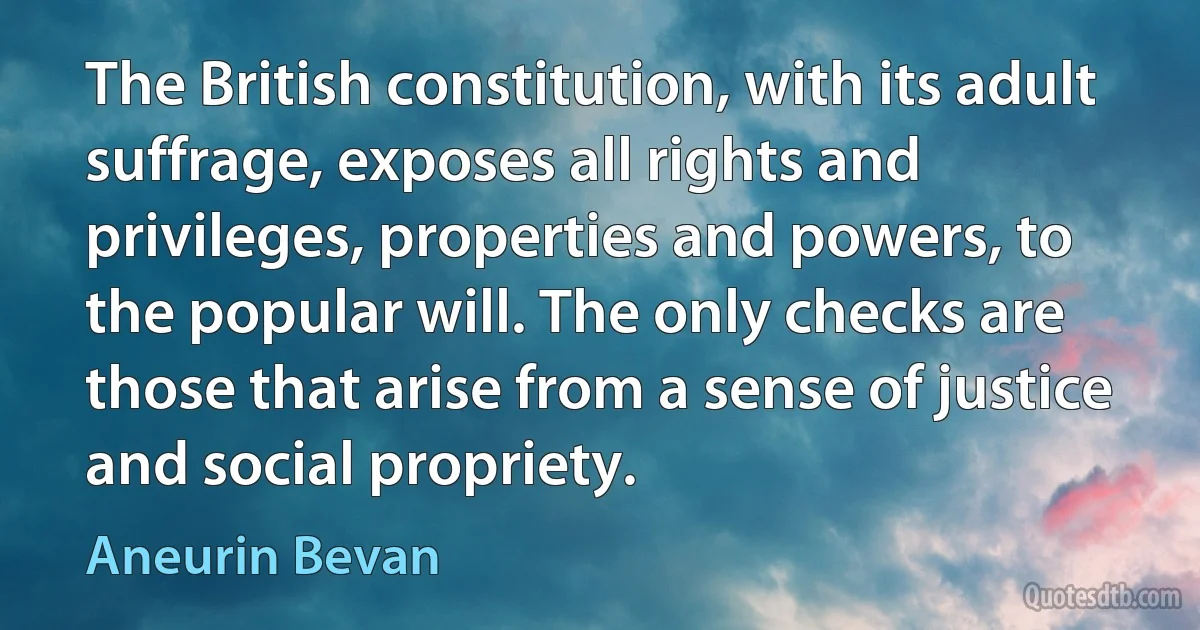British Quotes - page 70
I think that British politics, as at present constituted do make it difficult for people who are essentially men of the centre-I am a man of the left centre, but I've never pretended to be terribly far away from the centre of British politics. ... The gladiatorial nature of the House of Commons, with two sides lined up against each other, puts a premium on disagreement rather than upon agreement. This is inclined on both sides to give a greater strength to the wings rather than to the centre. ... there are appalling economic problems facing this country at the present time...I don't think it's terribly useful, terribly relevant or terribly convincing just to engage in an endless game of tu quoque. You've got to think of something better than 'It's your fault',-'No, it's not, it's your fault'. There's a sterility in this which is a danger to the country.

Roy Jenkins
We must bring home to the people the seriousness of the country's present plight and the future problems that we face. We must convince them of their power to overcome all difficulties by common effort. We must draw out from people that courage and determination which have always been the hallmarks of the British character.

Stafford Cripps
[The third principle of British democracy was that national sovereignty belonged to the people.] We lend it to our representatives to use for five years at a time. ... Any Government or MP pretending to give away these sovereign powers without the explicit consent of the people is acting unconstitutionally. Laws that pretend to take away these powers permanently have no moral authority. ... [Heath's government] will fail because they are trying to act contrary to centuries of British tradition. The people will not have it. But the resistance that is building up is not, in any sense, revolutionary.

Tony Benn
[T]he Opposition [Conservative Party] have consistently resisted, from the time when they were in office until now, any extension of British control over oil in the North Sea. ... The development of the North Sea is going on apace. But we believe that it is right that the British people should have a growing share in the benefits of the North Sea. ... It passes my understanding why a party which used to pretend to speak for the national interest should regularly denounce any extension of British control and ownership of the oil in the continental shelf.

Tony Benn
The Peasants' Revolt came as feudalism was breaking down in Britain, just as capitalism is breaking down today. Mass unemployment, the destruction of the welfare state, the health service and comprehensive education, would not be accepted, any more than would nuclear weapons based on British soil. We will not be satisfied until there is justice in Ireland. We will not allow the House of Lords to prevent us from doing what we want to do, nor the Community in Brussels, nor American generals in the Pentagon to decide what our future can be. The only way we can change Britain and the world is when working people gather together and decide whether they will change it. When we have decided we will change it, no power on earth can stop us.

Tony Benn
The revolt against imperialism in the Colonies, therefore, even when it takes on a nationalistic form, is a revolt against British capitalism and colonial peoples in revolt must be looked upon by a Socialist movement in Great Britain as allies in the fight against the common enemy. This theory is fully developed in Stalin's Marxism and the National Question. The methods by which the Soviet Government has dealt with colonial peoples reveal a real basis for co-operation with so-called backward peoples as soon as the power of capitalism within the imperialist nation has been effectively broken.

Michael Foot
The British Constitution is an interesting contraption. I hope that is not too Burkeian a sentiment for a Thomas Paine-ite like myself to utter. There are many parts of it which die of apathy or inanition, and at the proper moment such parts have to be lopped off. That is what I should like to do with the House of Lords.

Michael Foot
The end of the era of cheap food is no small incident in British history, even if the Leader of the Liberal Party is not prepared to shed a single tear at the abandoned tomb of Richard Cobden. The instinct of the British people on these matters, particularly when it is sustained in the teeth of persistent opposition and propaganda from the main organisations and newspapers in the country, is not to be despised by those who aspire to govern them. I expect the right hon. Gentleman to take some account of these matters.

Michael Foot
The history of British Socialism cannot be written without constant reference to the Celts, and perhaps I may say in passing that this was one reason why I was so eager to see a Devolution Act passed through the House of Commons, to help keep the Celts within the United Kingdom. The blood of our Labour Movement cannot tingle properly without them, devolution or no devolution.

Michael Foot
The wolves are Bush and Blair, not the soldiers. The soldiers are lions led by donkeys, sent to kill and be killed. As for being a traitor, the people who have betrayed this country are those who have sold it to a foreign power and who have been the miserable surrogates of a bigger power for reasons very few people in Britain can understand. [...] The best thing British troops can do is to refuse to obey illegal orders.

George Galloway
During the years Hardie was in Parliament, from 1892 to 1895...he made the subject of unemployment an issue in British politics. Before then the State acknowledged no obligation to make provision for the unemployed. They were regarded as being in the main a lot of drunken, thriftless, ne'er-do-wells whose condition was due to their own fault. By persistently keeping the unemployed question before Parliament, and by speaking at week-ends throughout the country, Hardie at last succeeded in getting the Government to admit a public responsibility for the unemployed. To Keir Hardie, more than to any other man, the credit was due for the great change which, in the last 30 years, had come over Parliament, and the awakening of the public conscience on this question.

Keir Hardie
The plantation of Ulster, right or wrong, wise or unwise, beneficent or not, did take place; neither it nor its consequences can be pretended out of existence. The people of this province are part of the British nation, and the soil of this province is British soil, because the great majority of its inhabitants are so minded.

Enoch Powell
Powell: The people who think they are the people of this country will be fighting for their country.
Ross: I'm not sure that I understand that. Surely many black people regard themselves as genuinely British.
Powell: People fight for power, people fight for domination.
Ross: And this will be a battle for domination?
Powell: And they try to resist it.
Ross: What do you think the outcome will be?
Powell: Appalling.

Enoch Powell
We describe a Monarch by designating the territory of which he is Monarch. To say that he is Monarch of a certain territory and his other realms and territories is as good as to say that he is king of his kingdom. We have perpetrated a solecism in the title we are proposing to attach to our Sovereign and we have done so out of what might almost be called an abject desire to eliminate the expression "British." The same desire has been felt-though not by any means throughout the British Commonwealth-to eliminate this word before the term "Commonwealth." ... Why is it, then, that we are so anxious, in the description of our own Monarch, in a title for use in this country, to eliminate any reference to the seat, the focus and the origin of this vast aggregation of territories? Why is it that this "teeming womb of royal Kings," as Shakespeare called it, wishes now to be anonymous?

Enoch Powell
I would say that it is a fearful doctrine, which must recoil upon the heads of those who pronounce it, to stand in judgment on a fellow human-being and to say, "Because he was such-and-such, therefore the consequences which would otherwise flow from his death shall not flow." ... Nor can we ourselves pick and choose where and in what parts of the world we shall use this or that kind of standard. We cannot say, "We will have African standards in Africa, Asian standards in Asia and perhaps British standards here at home." We have not that choice to make. We must be consistent with ourselves everywhere. All Government, all influence of man upon man, rests upon opinion. What we can do in Africa, where we still govern and where we no longer govern, depends upon the opinion which is entertained of the way in which this country acts and the way in which Englishmen act. We cannot, we dare not, in Africa of all places, fall below our own highest standards in the acceptance of responsibility.

Enoch Powell
We, this nation, have a right, because we are such, to formulate and follow the standards by which we will judge the worth of what we do and of what others offer to us and expect from us... The breath which condemns submission to laws this nation has not made condemns submission to scales of value which this nation has not willed. To both sorts of submission I ascribe that haunting fear, which I am sure I am not alone in feeling, that we, the British will soon have nothing left to die for. That was not a slip of the tongue. What a man lives for is what a man dies for, because every bit of living is a bit of dying. At the beginning I refused to define patriotism; but now at the end I venture it. Patriotism is to have a nation to die for, and to be glad to die for it-all the days of one's life.

Enoch Powell
Powell did strike me, however, as an extremely capable and intelligent Conservative politician. There was no fanatical gleam in his eyes, though I do remember feeling that his attitude to India was slightly strange. I could not place it at the time; it was neither jingoism nor simply nostalgia, but nor was it the scholarly interest of a historian or the detached reflections of a logician. Many years later when I was reading Paul Scott's opus on the British in India, I suddenly remembered Powell. One of the major characters in Scott's novels reminded me of him. It was Ronald Merrick, whose ambiguous class background in Britain ultimately exploded in colonial India. This was a reflection of something that ran very deep in many middle- and lower-middle-class Englishmen and women who had served as colonial administrators or officers in India.

Enoch Powell
For those who saw and heard Enoch Powell, the memory is indelible – the black moustache, the burning eyes, the hypnotic, metallic voice, the precision of language, the agility in debate. These will be largely lost to future generations. But, in a more important respect, Powell will survive more surely than any other British politician of the 20th century except Winston Churchill. His speeches and writings will be read so long as there exists a political and parliamentary culture in which speaking and writing matter. And if there comes a time when such a culture is all but destroyed, those brave few who wish to restore it will find in the thoughts of Enoch Powell something approaching their Bible.

Enoch Powell
He [Hitler] then asked me what other problems there were between us... I replied that British opinion would be glad to know what might be his present attitude to the League of Nations and to Disarmament. There were no doubt other questions arising out of the Versailles settlement which were capable of causing trouble if they were unwisely handled:-Danzig, Austria, Czechoslovakia. On all these matters we were not necessarily concerned to stand for the status quo as of to-day, but we were very much concerned to secure the avoidance of such treatment of them as would be likely to cause trouble. If reasonable settlement could be reached with the free assent of those primarily concerned, we certainly had no desire to block them.

Edward Wood
[T]he broad record of the British race stands to be judged on facts that are incontestable. It is the fact that during the nineteenth century, when the power of this country was unchallenged, there was no nation in Europe that felt for that reason insecure, or that did not recognize our power to be an instrument of peace. The Pax Britannica has been no empty or self-righteous boast of purpose. It is the fact too that in every corner of the world where men of British race have established influence, there by immutable law of nature you find established the seed and plant of liberty. It is the trail by which is marked their progress, interpreted to all by the standards of good faith, respect for law, and equal justice. Most truly, therefore, of our people was it said: "Their country's cause is the high cause of freedom and honour. That fairest earthly fame, the fame of freedom, is inseparable from the names of Albion, Britain, England.”.

Edward Wood



